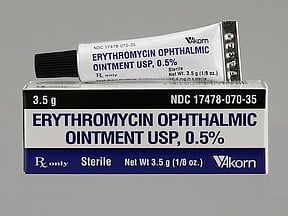My prescription
Edit
1GM of 5MG/GM, Erythromycin (1 Tube)
Select pharmacy

CVS
$19.39
COUPON PRICE
Walmart
$4.93
COUPON PRICE
Walgreens
$5.76
COUPON PRICE
Albertsons
$5.78
COUPON PRICEErythromycin savings card
Show this card to your pharmacist
Walmart
$4.93
BIN
ID
PCN
GRP
019876
LH58673106
CHIPPO
LHX
Powered by
More prescriptions for urinary tract infection
More prescriptions for urinary tract infection
Erythromycin dosage forms
Dosage Quantity Price from Per unit 1GM of 5MG/GM 1 Tube $4.93 $4.93 1GM of 5MG/GM 2 Tubes $7.36 $3.68 1GM of 5MG/GM 3 Tubes $9.79 $3.26 30GM of 2% 1 Tube $22.78 $22.78 30GM of 2% 2 Tubes $36.98 $18.49 30GM of 2% 3 Tubes $54.32 $18.11
| Dosage | Quantity | Price from | Per unit |
|---|---|---|---|
| 1GM of 5MG/GM | 1 Tube | $4.93 | $4.93 |
| 1GM of 5MG/GM | 2 Tubes | $7.36 | $3.68 |
| 1GM of 5MG/GM | 3 Tubes | $9.79 | $3.26 |
| 30GM of 2% | 1 Tube | $22.78 | $22.78 |
| 30GM of 2% | 2 Tubes | $36.98 | $18.49 |
| 30GM of 2% | 3 Tubes | $54.32 | $18.11 |
Erythromycin Warnings
The following safety information is crucial for the proper use of erythromycin eye ointment. It highlights potential risks and precautions that should be observed. Please review these guidelines carefully and discuss any concerns with your healthcare provider.
Application Area: Erythromycin eye ointment is intended solely for application on the eye's surface. It must not be applied to the mouth, nose, or any other body parts.
Risk of New or Worsening Infections: Prolonged use of erythromycin eye ointment may increase the likelihood of developing new eye infections, including fungal ones. It should not be used if you have a viral eye infection as it can exacerbate the condition. Notify your healthcare provider if you experience any of the following: eye pain, redness, blurred vision, light sensitivity, or watery discharge, or if symptoms persist beyond a few days of treatment, as these may indicate a new or worsening infection. Avoid using the ointment longer than prescribed to reduce these risks.
Allergic Reactions: If you have a history of allergies to antibiotics like clarithromycin (Biaxin) or azithromycin (Zithromax), inform your healthcare provider before using erythromycin eye ointment. Be vigilant for signs of allergic reactions, such as swollen eyelids or red, itchy eyes. Should these symptoms occur, discontinue use immediately and contact your healthcare provider.
There are no listed contraindications for erythromycin eye ointment. Always follow your healthcare provider's instructions for safe and effective use of this medication.
Erythromycin Side Effects
Common side effects:
- Burning
- Redness
- Itching
- Dry skin
- Peeling skin
- Oily skin
- Eye irritation
- Eye redness
Less common but important to monitor:
- Unusual skin irritation
- Fungal skin infections
- Bacterial skin infections
Serious side effects:
- Rash
- Itching
- Swelling of the face, tongue, or throat
- Severe dizziness
- Trouble breathing
Erythromycin Interactions
Erythromycin, a widely used antibiotic, can interact with various medications, potentially leading to serious health risks. Understanding these interactions is crucial for safe and effective treatment.
Heart Rhythm Medications: Combining erythromycin with drugs that affect heart rhythms, such as Amiodarone, can increase the risk of QT interval prolongation, potentially leading to life-threatening arrhythmias like torsades de pointes.
Statins: Erythromycin can elevate levels of certain cholesterol-lowering drugs, including Lovastatin and Simvastatin, raising the risk of muscle damage (rhabdomyolysis).
Calcium Channel Blockers: When taken with medications like Verapamil or diltiazem, erythromycin may lead to increased drug levels, causing low blood pressure and slow heart rate.
Anticoagulants: Erythromycin can enhance the effects of blood thinners such as Warfarin, increasing the risk of bleeding.
Benzodiazepines: The antibiotic may decrease the clearance of drugs like Triazolam and Midazolam, leading to prolonged sedation and respiratory depression.
Ergot Alkaloids: Concurrent use with ergotamine or Dihydroergotamine has been linked to severe vasospasm and ischemia.
Other Medications: Erythromycin can interact with a range of other drugs, including certain antihistamines, antifungals, and immunosuppressants, potentially leading to adverse effects.
To minimize risks, always inform your healthcare provider about all medications and supplements you are taking before starting erythromycin. They can assess potential interactions and adjust your treatment plan accordingly.

